Writing
> Senbrek
12 Top Writing Tips for the Oxford Test of English. 5 immersive virtual tours to practise your English. Field trips are an opportunity to explore and learn in new and exciting environments, but for most of us, they’re not an option right now.
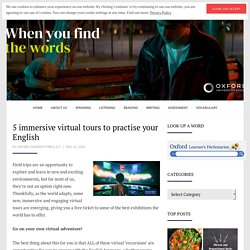
Thankfully, as the world adapts, some new, immersive and engaging virtual tours are emerging, giving you a free ticket to some of the best exhibitions the world has to offer. Go on your own virtual adventure! The best thing about this for you is that ALL of these virtual ‘excursions’ are opportunities for you to engage with the English language, whether you’re learning solo or with your friends online.
Exploring English: Shakespeare. Introductions - Discursive - National 5 English Revision - BBC Bitesize. Find out more. Five habits of effective English language learners. What habits should English language learners adopt to help them meet their goals?
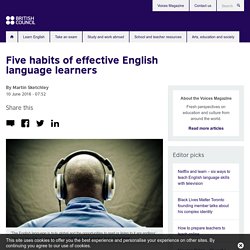
Martin Sketchley, latest winner of the British Council's Teaching English blog award, gives us his top five. Learning English, or any language, can be a challenging but rewarding experience. To make progress, you need to put in a lot of dedication and effort, but you also need to develop the right habits. Here are five habits that have helped my students achieve their aims. 1. The decision to study English, or return to the English language classroom after a long break, can be quite overwhelming.
Tip: A wonderful app that I have used for studying is My Study Life. 2. When studying a language, it's essential to keep vocabulary notes from lessons. Tip: Try using your mobile phone to record vocabulary from your lessons. 3. To successfully learn new vocabulary and grammar, you need to review your lesson or self-study notes regularly. 4. When in class, try to participate as much as possible.
Five digital resources for autonomous English language practice. Cristina Cabal, six-time winner of the TeachingEnglish blog award , tells us her favourite apps, sites and browser extensions to make autonomous learning fun.
Language proficiency does not happen within a set time. It’s a long process that requires patience, and practice outside of the classroom.
Practise your use of formal and informal English with these quizzes. Formal and informal writing. Formal and informal verbs. Formal and informal language. We use formal language in situations that are serious or that involve people we don’t know well.
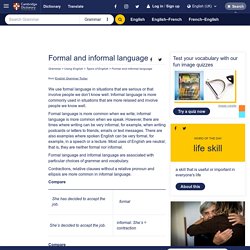
Informal language is more commonly used in situations that are more relaxed and involve people we know well. Formal language is more common when we write; informal language is more common when we speak. However, there are times where writing can be very informal, for example, when writing postcards or letters to friends, emails or text messages.
There are also examples where spoken English can be very formal, for example, in a speech or a lecture. Most uses of English are neutral; that is, they are neither formal nor informal. Formal language and informal language are associated with particular choices of grammar and vocabulary. Contractions, relative clauses without a relative pronoun and ellipsis are more common in informal language. Compare More formal vocabulary commonly involves longer words or words with origins in Latin and Greek.
Over 1,000 Writing Prompts for Students. Sign up for our free Learning Network newsletter. Receive new writing prompts in your inbox every week.
Of all the resources we publish on The Learning Network, perhaps it’s our vast collection of writing prompts that is our most widely used resource for teaching and learning with The Times. We’ve published iterations of this post in the past — 200, 401 and even 650 prompts — but never before have we gathered all our prompts, for both personal and argument writing, into one categorized list. Admittedly, the list is huge. In fact, there are 1,225 questions below on everything from video games and fashion to smartphones and parenting, and each prompt links to a Times article as well as to additional subquestions that can encourage deeper thinking. Guns & the Justice System. Making a personal study plan. Teacher tips - final advice. Points to remember. The grammar you need.
Assessment criteria: Grammatical range and accuracy. Practice: writing a strong conclusion. How to finish: writing a strong conclusion. The art of the introduction. Using a more formal style. What does formal writing mean?
Assessment criteria: lexical resource. Writing - Upper intermediate B2. Information will soon be so easy to find on the internet that people will not need to remember anything.
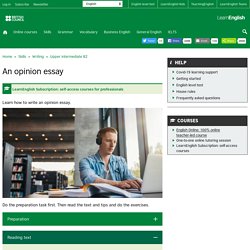
Do you agree? Nowadays all the information we could ever need is available online and some people say that means the end of having to learn anything. It is true that these days everything you want to know is a few clicks away as long as you have internet access. However, not everyone has working internet all the time, for example in certain buildings or remote locations, so we do need to be able to remember information. Moreover, it takes time to look up everything you need to know online, whereas remembering something is immediate. Another problem is the quality of the information online. Finally, the internet is a good tool but it is not a useful replacement for our brains. In conclusion, the internet offers us many things but it is still important to use our knowledge and memories.
Writing - Advanced C1. Some people think that some types of criminals should not go to prison.
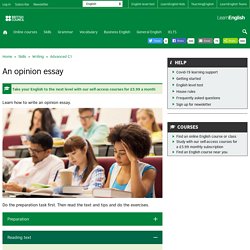
Instead they should do unpaid work in the community. To what extent do you agree? Owing to the great variety of crimes that can be punishable by prison, some people argue that not all criminals are the same and it would therefore be more appropriate to give certain criminals community service instead. I agree that in some cases, prison may not be the best solution and community service would probably have more benefits.
One justification given for prisons is to keep society safe by removing criminals from the outside world. Personally, I also believe punishments should reform people so they do not reoffend.
An opinion essay about fast food. A for and against essay about online communication. - Introduction. Introduction Academic writing is divided into paragraphs.
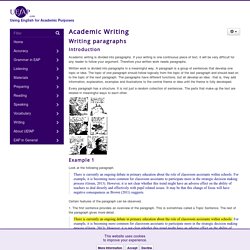
If your writing is one continuous piece of text, it will be very difficult for any reader to follow your argument. Therefore your written work needs paragraphs. Written work is divided into paragraphs in a meaningful way. A paragraph is a group of sentences that develop one topic or idea. Every paragraph has a structure. Example 1 Look at the following paragraph. There is currently an ongoing debate in primary education about the role of classroom assistants within schools.
Youtube. Writing Module. Teacher tips - Task Two. Over to you. Plan to paragraph. Cohesive devices. What makes a good paragraph?
Assessment criteria: Coherence and cohesion. Practice: making a plan. The importance of planning. Having enough to say. Ask yourself the question. Assessment criteria: Task response. Analysing the question. Question types. Writing Task 2: What you have to do. Achieve your work, study and migration goals with IELTS. General Training Writing Task 1 How to write a letter. : Free Writing Assistant.
Cambridge English Write & Improve. Academic Writing - task 1. IELTS Writing Task 1 - tips and advice. Describing Trends - Academic Phrasebank. Teacher tips for Task One. Describing processes and maps. Describing dynamic graphs, charts and tables. Describing static graphs, charts and tables. Things to remember. Review of key language for describing trends. Describing trends. Making comparisons. The language of numbers. Writing an overview. IELTS WRITING STEP 1.8 ANSWER. Understanding the question and writing an introduction.
Types of visual information
General English - Magazine. English Skills - Writing. English writing skills practice. Working on your writing. How IELTS is assessed.






